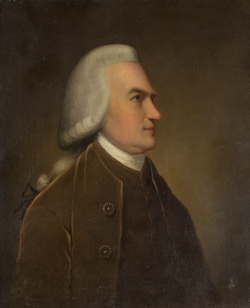“Upon the inhabitants in general lodging their arms in Faneuil-hall”
On 22 Apr 1775, with the Massachusetts militia besieging the king’s soldiers inside Boston, many townspeople wanted to get out of the way.
Gen. Thomas Gage, army commander and royal governor, had his own priorities: forestalling any citizen uprising against those soldiers.
Gage had approached Boston’s selectmen to start discussions on avoiding discontent and unrest. Those officials seized the opening to talk about letting people leave town.
In addition to five of the seven selectmen (John Hancock and Oliver Wendell had left Boston earlier in the month before fighting broke out), the town appointed four men to communicate with the governor. They were all established businessmen with political experience:
It’s a sign of the emergency situation that the town met on Sunday, 23 April. Indeed, Hill’s job as warden had been to ensure that people didn’t conduct business on the Sabbath. But these were desperate times.
The record published in the 26 June Boston Gazette continued:
On the other hand, the province had just gone through several months of Patriots complaining that they had the right—indeed, the obligation—to amass weapons, gunpowder, and other military supplies. Bostonians couldn’t participate much in that arming of the countryside, being under army occupation, but they supported it. Would they give up their means of self-defense?
TOMORROW: The townspeople’s expectations?
Gen. Thomas Gage, army commander and royal governor, had his own priorities: forestalling any citizen uprising against those soldiers.
Gage had approached Boston’s selectmen to start discussions on avoiding discontent and unrest. Those officials seized the opening to talk about letting people leave town.
In addition to five of the seven selectmen (John Hancock and Oliver Wendell had left Boston earlier in the month before fighting broke out), the town appointed four men to communicate with the governor. They were all established businessmen with political experience:
- James Bowdoin, a member of the Council, firm Whig, and, therefore, longtime headache for Govs. Francis Bernard and Thomas Hutchinson. He was, however, wealthy and learned, thus undeniably respectable. Also, though Bowdoin might excuse violence after the fact, he didn’t encourage it beforehand.
- Ezekiel Goldthwait (shown above), insurance broker, registrar of deeds, and veteran of other political offices, including Boston town clerk. While calling himself a Whig, Goldthwait was more centrist than most in that party and maintained friendly relations with the royal governors. Some people even called him a Tory.
- Henderson Inches, a Boston selectman voted out earlier in the decade for not pushing as hard on the Massacre orations as the voting public wanted, but still in the Whig party.
- Edward Payne, wounded in the Boston Massacre while standing peacefully on his front steps—but he chose not to sue about it.
- Alexander Hill, a warden and fireward often chosen to audit the town’s accounts. Though he had been put on the town’s committee of correspondence, Hill was rarely involved in protests and debates over imperial issues.
It’s a sign of the emergency situation that the town met on Sunday, 23 April. Indeed, Hill’s job as warden had been to ensure that people didn’t conduct business on the Sabbath. But these were desperate times.
The record published in the 26 June Boston Gazette continued:
Sabbath morning ten o’clock, April 23, 1775.Most men in Boston, as in other towns, were required by law to drill with the militia and therefore owned firelocks. Gen. Gage didn’t want those guns used against his soldiers. He also didn’t want people to take their weapons out of town, join the besieging force, or arm fighters in that force.
The town met according to adjournment.
The said committee made a verbal report. Whereupon it was desired that the committee would withdraw and reduce their report to writing, which was accordingly done, and is as follows, viz.
The committee appointed by the town to wait upon his excellency General Gage, with a copy of the two votes passed by the town yesterday in the afternoon; report, that they being read to him by the committee, and a long conference had with him upon the subject matter contained in the said votes, his excellency finally gave for answer, that upon the inhabitants in general lodging their arms in Faneuil-hall, or any other convenient place, under the care of the Selectmen, marked with the names of the respective owners, that all such inhabitants as are inclined may depart from the town, with their family’s and effects; and those who remain may depend upon his protection. And that the arms aforesaid at a suitable time would be return’d to the owners.
On the other hand, the province had just gone through several months of Patriots complaining that they had the right—indeed, the obligation—to amass weapons, gunpowder, and other military supplies. Bostonians couldn’t participate much in that arming of the countryside, being under army occupation, but they supported it. Would they give up their means of self-defense?
TOMORROW: The townspeople’s expectations?


